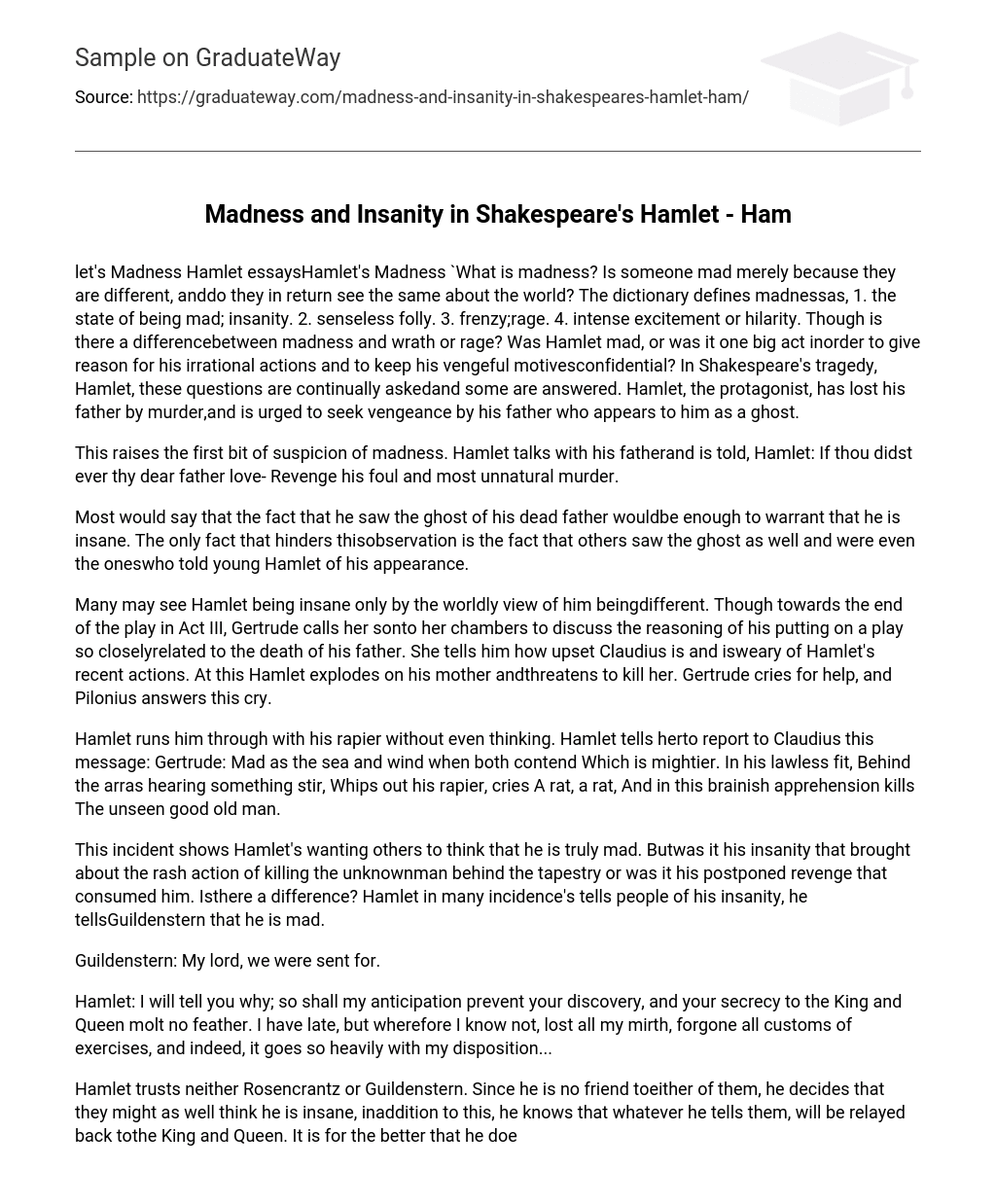What is madness? Does being different make someone mad? And do they see the world as mad in return? The dictionary provides the following definition of madness:
Insanity is the condition of being mad.
Foolishness lacking any logical foundation.
3. A state of frenzy and rage.
A state of extreme excitement or amusement.
In Shakespeare’s tragic play, Hamlet, the question of whether madness and wrath or rage are distinct is consistently raised and partly resolved. The main character, Hamlet, who has suffered the loss of his father through murder, struggles with the desire for revenge when he is encouraged by his father’s ghostly presence. This encounter leads to suspicions of madness as Hamlet engages in a conversation with his father and receives instructions to avenge his murder: “Hamlet: If thou didst ever thy dear father love- Revenge his foul and most unnatural murder.”
Many would argue that the sighting of his deceased father’s ghost would be sufficient evidence of his insanity. However, the presence of others who also witnessed the ghost, and even informed young Hamlet about its appearance, undermines this observation.
Many people perceive Hamlet as insane simply because he is different from the norm. However, in Act III of the play, Gertrude summons her son to her chambers to discuss his decision to stage a play that closely relates to his father’s death. She expresses Claudius’s displeasure and concern over Hamlet’s recent behavior. In response, Hamlet erupts in anger towards his mother and threatens her life. Gertrude cries out for help, and Pilonius responds to her plea.
Hamlet impales him with his rapier without hesitating. He instructs her to inform Claudius of this message: Gertrude: Mad as the sea and wind when both contend Which is mightier. In his lawless fit, Behind the arras hearing something stir, Whips out his rapier, cries A rat, a rat, And in this brainish apprehension kills The unseen good old man.
This incident illustrates Hamlet’s desire for others to believe that he is genuinely insane. However, it is unclear whether his madness led him to impulsively kill the unidentified person hiding behind the tapestry or if it was his delayed quest for revenge that consumed him. Is there a distinction? On multiple occasions, Hamlet confesses his madness to various individuals, such as expressing it to Guildenstern.
Guildenstern: My lord, we were summoned.
Hamlet explains that he will share his reason because by doing so, he can prevent you from finding out on your own and also keep it a secret from the King and Queen. He adds that recently, for reasons unknown to him, he has lost all joy, abandoned all routines and activities, and indeed, his mood has become very burdened.
Hamlet has no trust in both Rosencrantz and Guildenstern, considering them as unfriendly individuals. Consequently, he chooses to portray himself as insane, fully aware that any information he shares with them will be reported to the King and Queen. It is in his best interest not to confide in them since they are the ones attempting to execute his death sentence. In a separate incident, Hamlet straightforwardly informs them of his madness, without resorting to any hidden wordplay.
Hamlet declares that he is only mad in a specific direction, specifically north-north-west. He then explains that when the wind blows from the south, he is able to distinguish between a hawk and a handsaw.
If Hamlet was genuinely insane, why would he speak about it? Everyone, except for his close friend Horatio, believes that Hamlet is genuinely mad. The Queen even expresses doubt about this when she sees the expression on Hamlet’s face upon the ghost’s appearance.
Hamlet asks Lady how she is. Queen sadly wonders why Hamlet appears lost in thought and seems to be talking to thin air. She notices that spirits are peering out from Hamlet’s eyes and his hair is standing on end, similar to soldiers waking up abruptly during an alarm.
The question of whether Hamlet was truly insane or simply feigning it is challenging to answer. Nevertheless, he displayed a considerable amount of anger and acted impulsively, which could be viewed as a type of madness. Despite this potential insanity, Hamlet did not lose any of his intelligence. He cunningly devised a plan to ensure that the King was held responsible for his actions and effectively carried it out.





